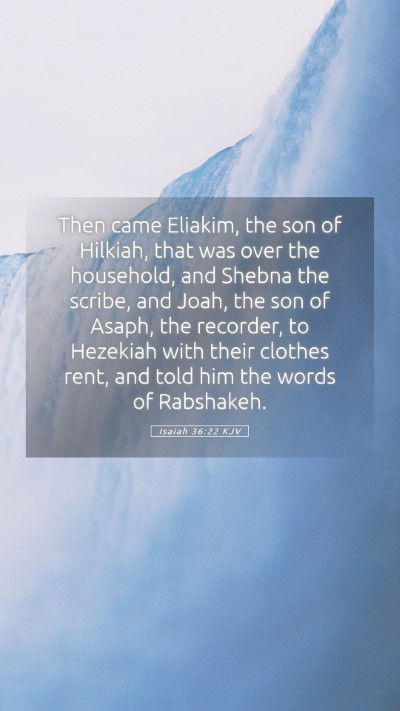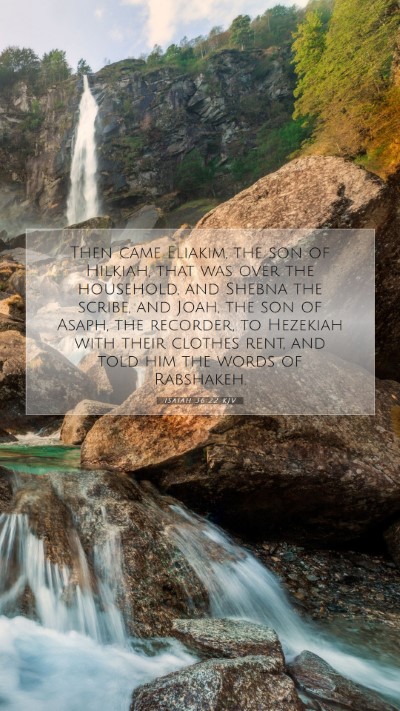Understanding Isaiah 36:22 - In-Depth Bible Verse Commentary
Bible Verse: Isaiah 36:22 - "Then came Eliakim, the son of Hilkiah, which was over the household, and Shebna the scribe, and Joah, the son of Asaph, the recorder, to Hezekiah with their clothes rent, and told him the words of Rabshakeh."
Contextual Overview
Isaiah 36:22 finds its place within a historical narrative where the Assyrian king Sennacherib has sent his representative, Rabshakeh, to Jerusalem to intimidate and demoralize the inhabitants regarding the impending siege. This moment of distress for King Hezekiah's administration reveals deep cultural and theological implications, reflecting the intense psychological warfare of the time.
Commentary Insights
The commentaries from Matthew Henry, Albert Barnes, and Adam Clarke provide rich theological insights and practical understandings:
-
Matthew Henry:
Henry notes how the act of the Israelite leaders tearing their clothes symbolizes deep grief and distress. It serves as a visual indication of their recognition of the dire situation. This embodiment of despair highlights the weight of Rabshakeh’s taunts and the gravity of the circumstances facing Jerusalem.
-
Albert Barnes:
Barnes emphasizes the roles of the figures mentioned—Eliakim, Shebna, and Joah—and the significance of their positions within Hezekiah's administration. Their response to Rabshakeh’s threats is reflective of a serious political crisis and a plea for divine intervention, exposing a moment of desperation coupled with hope in God's providence.
-
Adam Clarke:
Clarke elaborates on the administrative structure of King Hezekiah’s court. He discusses the importance of these officials and their reaction in light of Rabshakeh’s taunting message, suggesting that it was not merely fear for their lives but also concern for the very identity and faith of the nation. The act of rent clothes is noted as a traditional Jewish practice of expressing distress.
Theological Implications
This verse encapsulates a significant moment highlighting the tension between human despair and divine sovereignty. The tearing of garments is a scriptural expression of mourning and distress, illustrating the profound human experience in times of crisis. The actions of Eliakim and others can be viewed as emblematic of seeking God's help amidst overwhelming challenges—a theme prevalent throughout the Scriptures.
Cross References
- 2 Kings 18:37: "Then came Eliakim the son of Hilkiah, which was over the household, and Shebna the scribe, and the elders of the priests, covered with sackcloth, to Hezekiah with their clothes rent..."
- Isaiah 37:1: "And it came to pass, when King Hezekiah heard it, that he rent his clothes, and covered himself with sackcloth, and went into the house of the Lord."
- 1 Kings 21:27: "And it came to pass, when Ahab heard those words, that he rent his clothes, and put sackcloth upon his flesh, and fasted..."
Application for Today
In today's context, Isaiah 36:22 serves to remind individuals that moments of distress are universal in the human experience. The examples set by Eliakim and his companions can lead believers to seek God earnestly during times of trouble, demonstrating that true strength lies in acknowledging vulnerability and looking to a higher power for solutions.
Key Takeaways
This verse not only tells a historical story but also emphasizes essential themes such as grief, leadership in crisis, and the necessity of faith. In understanding this Bible verse, one can delve deeply into themes of human emotion, divine reliance, and the rich historical tapestry of Scripture that can inform modern faith practices.


